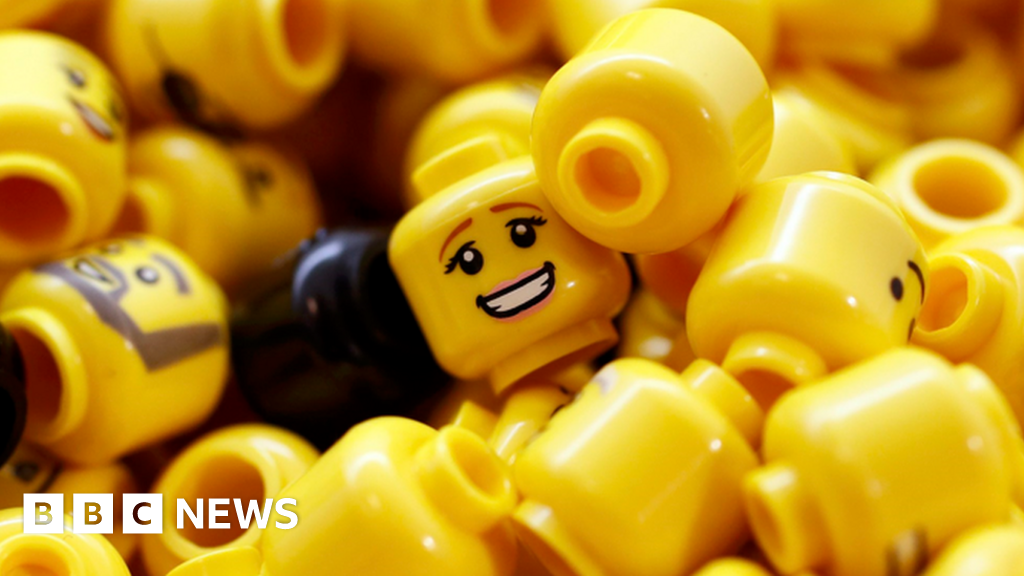Lego Sees Profits Fall As Pandemic Boost Fades

Lego has shops around the world including two flagship stores in Beijing and Shanghai
Toymaker Lego saw profits fall in the first half of the year as the bumper sales growth seen during the pandemic starts to fade.
The Danish company performed exceptionally well during lockdowns as households stocked up on toys and games to keep them occupied at home.
However, revenues have since stalled, with sales up just 1% in the first half of the year.
Profits at the toymaker dropped 17.7% to 5.5bn Danish kroner (£634m; $807m).
The company had pinned its hopes on China, with its burgeoning middle-class who are eager to buy Western products.
Lego opened 58 stores in the first half of the year in China, as the world's second largest economy began its big reopening as covid-related restrictions were lifted across the country.
However, sales in the country have not been as strong as expected.
"The return to more normal conditions, where people go into stores and spend again, has been slower in China than what we anticipated," Niels Christiansen, chief executive officer of Lego said.
Despite the slow start, China remains a "long-term growth" target for Lego, with more store openings in the pipeline.
The company already has large flagship stores in Shanghai and Beijing.
Lego is also building two new factories in Vietnam and the United States that will open in 2024 and 2025 and will be expanding its existing plants across the world.
It is planning on spending more on sustainability as well after coming under pressure about the amount of plastic used in its products.
The company has pledged to triple spending over three years as it looks to eliminate plastics that come from fossil fuels.
Mr Christiansen said the fall in profits had been due to higher raw material costs and more money being spent on factories. Despite the fall, Lego remains the world's leading toymaker.
Much of its success is attributed to the Star Wars and Lego Icons franchises alongside its flagship products.
It marks a big turnaround after the toymaker ran into hard times in the 2000s, as sales plunged while it racked up a huge stockpile of debt. At the time, analysts felt the company was overly reliant on its legacy products and had not added any exciting new lines to its portfolio.
The unlisted company, still wholly owned by the Christiansen family, recovered by focusing on franchises and films in particular Lego Batman, Harry Potter and Ninjago.
For grown-up children it introduced Lego Architecture with replicas of the Guggenheim museum, Burj Khalifa skyscraper and Robie House which helped broaden their target market. It also branched out by introducing the "Mini Doll".
The products were helped by the success of the Lego movies and theme parks across the world.
From Chip War To Cloud War: The Next Frontier In Global Tech Competition
The global chip war, characterized by intense competition among nations and corporations for supremacy in semiconductor ... Read more
The High Stakes Of Tech Regulation: Security Risks And Market Dynamics
The influence of tech giants in the global economy continues to grow, raising crucial questions about how to balance sec... Read more
The Tyranny Of Instagram Interiors: Why It's Time To Break Free From Algorithm-Driven Aesthetics
Instagram has become a dominant force in shaping interior design trends, offering a seemingly endless stream of inspirat... Read more
The Data Crunch In AI: Strategies For Sustainability
Exploring solutions to the imminent exhaustion of internet data for AI training.As the artificial intelligence (AI) indu... Read more
Google Abandons Four-Year Effort To Remove Cookies From Chrome Browser
After four years of dedicated effort, Google has decided to abandon its plan to remove third-party cookies from its Chro... Read more
LinkedIn Embraces AI And Gamification To Drive User Engagement And Revenue
In an effort to tackle slowing revenue growth and enhance user engagement, LinkedIn is turning to artificial intelligenc... Read more

